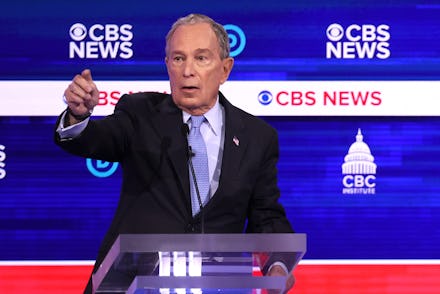Sorry, but it looks like the Bloomberg support last night was legit

Given that former New York City Mayor Mike Bloomberg has essentially bought his way into the upper echelons of the 2020 Democratic presidential primary race, it stands to reason that people would be rightly skeptical about Bloomberg's abnormally vocal supporters during Tuesday evening's CBS News debate in South Carolina — supporters who could be heard enthusiastically hooting and hollering multiple times during the former Republican's answers. This is, after all, someone who appeared to barely stop himself from saying that he "bought" the Democratic majority in Congress in 2018 when asked Tuesday about down-ballot races. Is it so far-fetched to think that he might have bought his own cheering section, as well?
The theory that Bloomberg may have stacked the debate audience with paid shills quickly gained steam over the course of the night, with a number of news outlets and Twitter pundits highlighting both the incongruity of Bloomberg's vocal supporters as well as the fact that he's not even on the South Carolina ballot for this Saturday's primary race. And like any good conspiracy theory, people were quick to find a piece of legitimate-seeming evidence to back up their allegation — in this case, a local Charleston, South Carolina, news report from Feb. 6 that claimed the only way audience members could guarantee a seat at the debate was, per the South Carolina Democratic Party website, was "to become a sponsor of the debate" with prices ranging from $1,750 to $3,200.
Egregiously high ticket prices? A candidate notorious for buying astroturfed support? On the surface, it seemed entirely plausible, especially because in tandem with surprisingly strong support for Bloomberg came boos and jeers directed at Bernie Sanders, the Vermont senator who is certainly no fan of billionaires. But — however surprising this may seem to a certain swath of Twitter users — it seems as if Bloomberg's cheers were organic after all.
Both the South Carolina Democratic Party and the Democratic National Committee denied any campaign had been given outsized influence among debate attendees, as did a representative from the Bloomberg campaign itself.
Speaking with The Washington Post, the Bloomberg campaign said it had been given 15 tickets for the debate, which it then gave to three campaign organizers, three volunteers, and a number of current and former elected officials. The Post did note in a parenthetical that "a follow-up email asking if any additional supporters were in the room" for the Bloomberg campaign went unanswered, but concluded that "it seems to be wrong" that the Bloomberg camp paid plants to cheer in the audience.
Additionally, Lillian Donahue, the local South Carolina reporter who initially published the debate "sponsorship" rates, told the Post that the section of the local Democratic party's website that had listed prices was changed after her earlier reporting.
In fact, despite not running in the South Carolina primary race, Bloomberg does indeed enjoy a considerable level of support in the state, per FiveThirtyEight's aggregate polling totals, which show him beating both Minnesota Sen. Amy Klobuchar and Pete Buttigieg, the former mayor of South Bend, Indiana, there. And while it's impossible to quantify exactly who was in the debate room cheering at any given time, it seems as if people in South Carolina might actually just like what Bloomberg has spent more than half a billion dollars selling.
So while it doesn't appear that Bloomberg specifically paid people to cheer him on in the debate itself, the support was likely largely a result of his astronomical campaign budget, which is probably the reason that voters in the Palmetto State know who he is at all. The debate, really, was just a middleman.